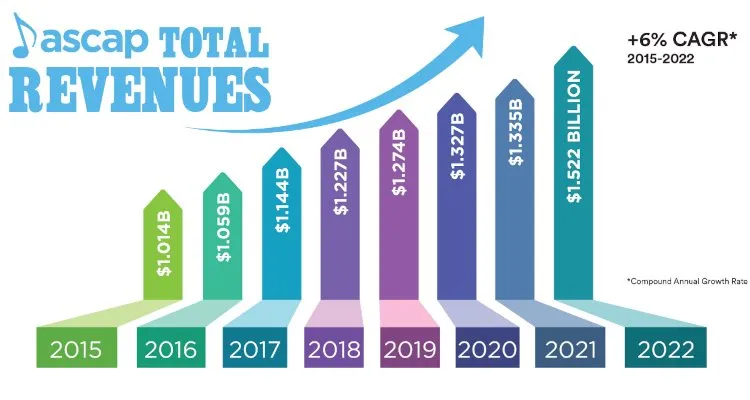
Photo Credit: ASCAP
The American Society of Composers, Authors and Publishers (ASCAP) has reported a record high of $1.52 billion in collections for 2022, with over $1.38 billion having been made available for distribution to members.
ASCAP, which now bills itself as “the only performing rights organization in the US that operates on a not-for-profit basis,” revealed its 2022 financials today. According to the New York City-headquartered entity, overall collections increased by $187 million from 2021 to crack the aforesaid $1.522 billion in 2022.
Within the sum, ASCAP’s domestic revenue is said to have come in at $1.178 billion (up 16.5 percent/$167 million year over year), marking the second year in which stateside revenue “from US-licensed performances topped $1 billion,” per the PRO. “General licensing revenue” grew by about 40 percent YoY, radio hiked by 32 percent, streaming spiked by 16 percent, and audio visual achieved a seven percent uptick, the analysis shows.
Of course, ASCAP attributed the remaining $344 million or so in 2022 revenue to collections from foreign societies, a roughly 6.3 percent improvement from 2021 “despite challenges due to foreign currency exchange volatility.” International distributions came in at $340 million last year, higher-ups relayed.
On the payout side, ASCAP’s over 900,000 members (reflecting an increase of approximately 39,000 across the 12-month reporting period) were able to receive a total of $1.388 billion in royalties during 2022 – the sixth consecutive year in which the distribution figure surpassed the billion-dollar mark, the organization indicated.
Similarly, “funds available for domestic distributions of ASCAP US-licensed and administered performances” exceeded $1 billion for the first time, jumping 14.9 percent YoY to hit $1.048 billion during 2022, according to the PRO.
Addressing ASCAP’s 2022 showing in a statement, CEO Elizabeth Matthews emphasized that the PRO solely pays “songwriters and publishers, not private investors.”
“ASCAP is the only US PRO that operates on a not-for-profit basis which is a key differentiator among PROs,” communicated the former Viacom Media Networks exec Matthews. “ASCAP creator and publisher members are the sole beneficiaries of this growth because we invested years ago in cloud computing, enabling us to address the challenges of digital streaming efficiently, and because we only pay songwriters and publishers, not private investors.”
Matthews’ comments come about five months after BMI made official its shift to a for-profit model, following an unsuccessful pursuit of a multibillion-dollar sale – and a number of subsequent layoffs – earlier in 2022. Notwithstanding this pivot, both BMI and ASCAP remain subject to consent decrees.
In related news, Irving Azoff’s Global Music Rights in January settled a pair of lawsuits with radio groups, and Blackstone’s SESAC in February announced a digital licensing tie-up with Wise Music Australia.
